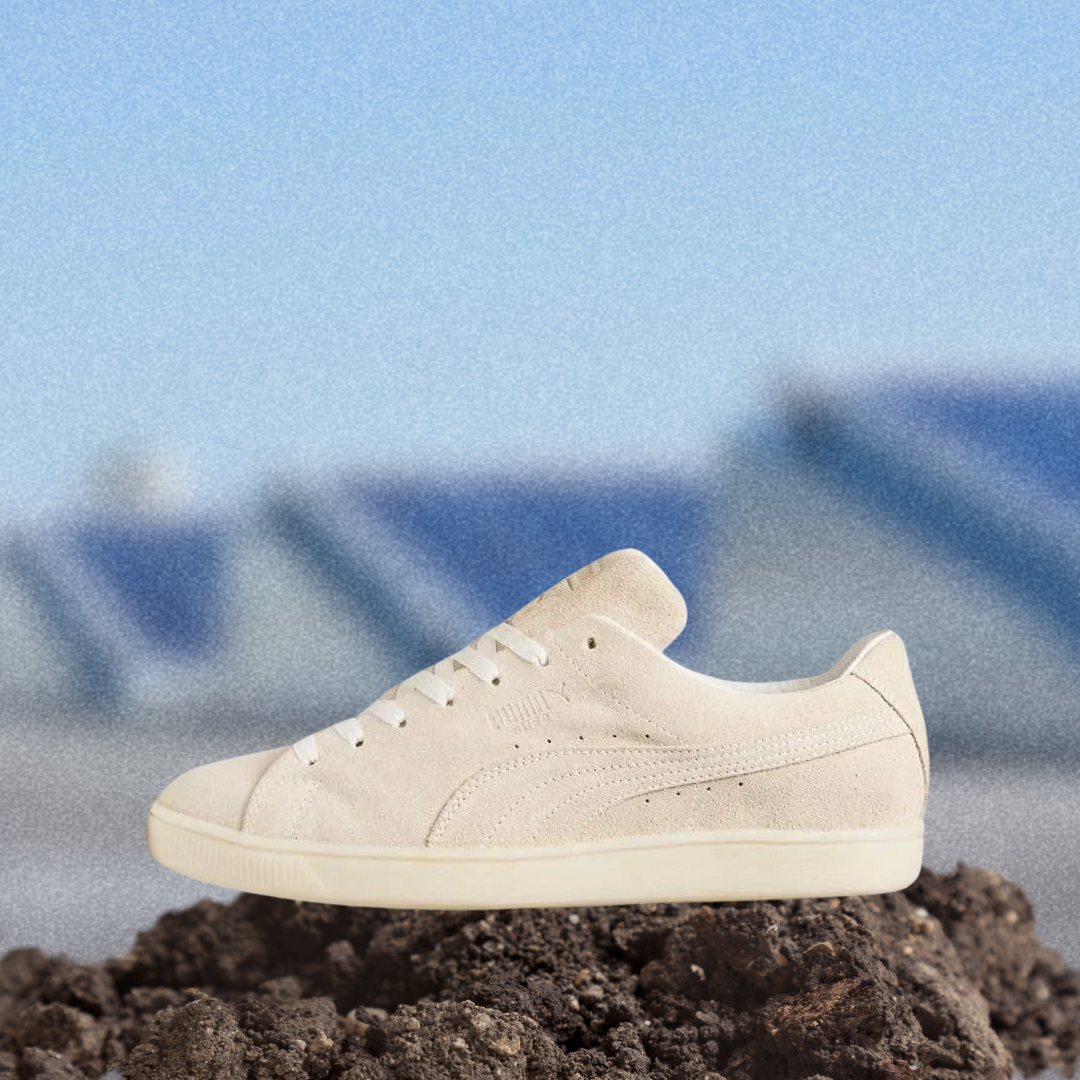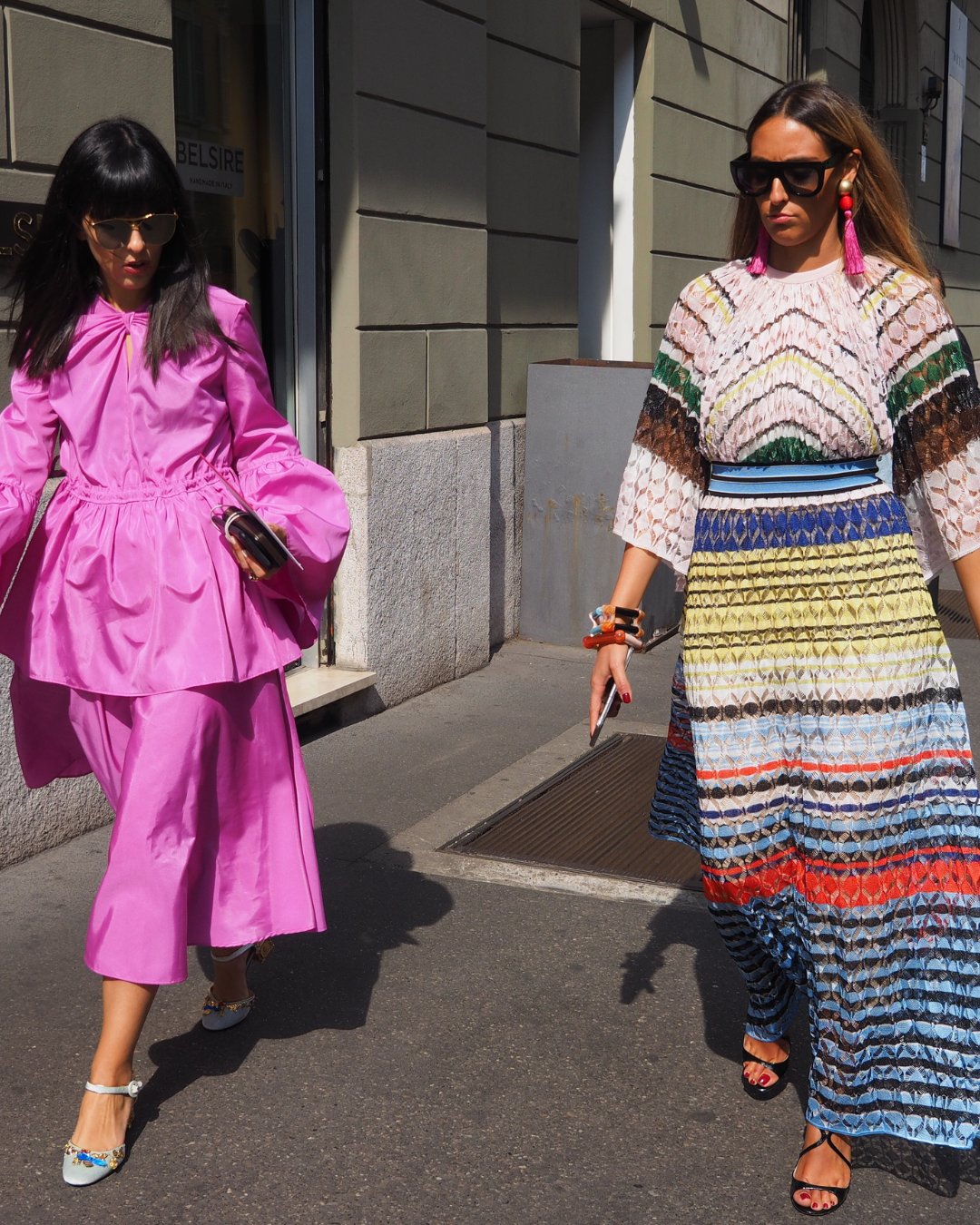H&M Group Launches Green Loan Program to Support Suppliers in Reducing Emissions, Net-a-Porter Launches Rental, Puma Successful Tests Fully Biodegradable Sneaker
Photo-Illustration: The Sustainable Fashion Forum | Puma
Welcome to Week/End, your quick-hit guide to this week’s sustainability news at the intersection of fashion, ethics, sustainability, and business. Stay ahead of the curve with Week/End – your compass guide to the latest developments in the fashion industry's pursuit of sustainability.
H&M Launches First-of-Its-Kind Green Loan Program to Support Suppliers in Reducing Emissions
H&M Group, in collaboration with DBS, Southeast Asia's largest bank and consultancy firm Guidehouse, has unveiled a pioneering green loan program under the banner of the Green Fashion Initiative. This program is part of H&M’s strategy to achieve net-zero CO2e emissions by 2040. It offers essential financial and technical support to suppliers and factories for adopting greener technologies and processes, such as upgrading facilities and reducing greenhouse gas emissions. A notable success story is India's Raj Woollen Industries, which utilized the loan for solar panel installation and energy-efficient upgrades.
In a statement, H&M emphasized the need for collective action in tackling climate challenges within the fashion industry. The company advocates for collaborative financing as a critical tool for rapid and scalable change. H&M calls for greater participation from other brands and financial institutions in these efforts, highlighting the need for shared investment and diverse support mechanisms for suppliers’ decarbonization efforts. As H&M's COP28 delegation prepares for upcoming discussions, the group is eager to engage with stakeholders to further this vital dialogue.
Puma Successfully Tests Fully Biodegradable Sneaker in Composting Trial
Puma has successfully completed its Re: Suede experiment, a significant step in sustainable footwear innovation. The experiment involved crafting sneakers from Zeology suede and hemp, combined with TPE outsoles, inspired by Puma's iconic Suede style. In collaboration with the Ortessa Group, 500 pairs of these shoes were tested for compostability in 2021 by volunteers in Germany before being composted at an Ortessa facility in the Netherlands. The two-year study showed that these sneakers could be transformed into compost under specific conditions, such as shredding and mixing with household waste over three and a half months.
While the Re:Suede sneakers initially did not align with standard industrial composting procedures, they ultimately decomposed successfully. Anne-Laure Descours, Puma's Chief Sourcing Officer, acknowledged the challenges faced and the need for further innovation to make this process commercially viable. Puma's commitment to sustainability extends through its Circular Lab hub, including initiatives like the Re:Fibre polyester recycling program. The company plans to release a detailed report on the Re:Suede trials, aiming to refine the design and transparency of its future sustainable footwear.
A New Initiative Positions India as a Leader in Sustainable Textile Solutions
Fashion for Good, in collaboration with the Laudes Foundation, IDH, Canopy, and Reverse Resources, has launched the Re-START alliance, an initiative to position India as a global leader in innovative textile recycling. Unveiled at the alliances ‘Reimagining Textile Waste’ conference in New Delhi, this alliance represents the culmination of the Sorting for Circularity India Project, which began in 2021. The project, involving industry giants like Adidas, Levi Strauss & Co., and Arvind Limited, aimed to overhaul India's textile waste market. Drawing from insights in the Wealth in Waste report, Fashion for Good released a comprehensive toolkit providing practical guidance and insights to address the challenges of unvalorised textile waste, aligning with upcoming waste management legislation.
The project conducted extensive pilots, processing 33 tons of textile waste to evaluate innovative sorting technologies and the viability of a closed-loop system. The Re-START alliance, scheduled for an official launch in Q1 2024, plans to expand upon these findings by establishing a formal textile waste supply chain, improving infrastructure, and advocating for policy changes. Jagjeet Singh Kandal, Country Director of IDH India, emphasized that this alliance marks a collaborative stride towards scalable, sustainable textile recycling solutions, propelling India to the forefront of this crucial environmental effort.
Global Fiber Production Hit a Record High According to Textile Exchange’s Materials Market Report
Textile Exchange published its annual Materials Market Report, formerly the Preferred Fiber and Materials Market Report, highlighting a record increase in global fiber production to 116 million tonnes in 2022, up from 112 million tonnes in 2021. This figure is expected to soar to 147 million tonnes by 2030 if current trends continue.
The report notes a modest increase in sustainable natural fibers like cotton and wool production. Conversely, the production of virgin fossil-based synthetic fibers, especially polyester, which represents 54% of global production, also increased. In a contrasting development, the proportion of all recycled fibers slightly decreased, with recycled polyester, primarily sourced from plastic bottles, facing market and production challenges.
Artist Jeremy Hutchinson and The Or Foundation Make Bold Statement with ‘Zombie’ Statue, Confronting Fashion Industry’s Role in Clothing Waste
In a striking act of activism coinciding with Black Friday, a time synonymous with peak consumerism, The Or Foundation, in partnership with artist Jeremy Hutchinson, unveiled an 8-foot tall ‘zombie’ statue constructed from discarded garments. This powerful symbol, embodying the consequences of fashion waste, was paraded around fashion headquarters and stores across England. Hutchinson maneuvered the ‘zombie’ to deliver letters to these companies, urging them to disclose their annual production figures. This initiative, part of the Or Foundation’s Speak Volumes campaign, is a poignant commentary on the overproduction prevalent in the fashion industry. It also ties into the Foundation's broader Stop Waste Colonialism movement, advocating for globally accountable Extended Producer Responsibility (EPR) policies to curb overproduction and improve waste management.
Remake’s Advocacy Bolstered by Fashion Impact Fund Grant
Remake, a nonprofit dedicated to advocating for fair pay and climate justice in the fashion industry, has been bolstered by a $50,000 grant from the Fashion Impact Fund. This timely support comes just as the Bangladeshi government announced a 56.25% increase in the monthly minimum wage for garment workers, raising it to 12,500 Bangladeshi taka (about $114). Although this increase is a step forward, it falls short of the expectations of workers and unions. The grant from the Fashion Impact Fund is set to play a crucial role in amplifying the voices of garment workers, highlighting their ongoing struggles. It aims to challenge the fashion industry to confront and address its profound impact on both people and the planet.
Bluesign® Launched Public GUIDE for Chemical Management Transparency
In a significant step towards enhancing supply chain transparency, Swiss material verification firm Bluesign® and its System Partners have introduced the bluesign® GUIDE. This open-access database showcases all 75,219 Bluesign-approved fabrics, accessories, and trims from its System Partners. Renowned for guiding companies in managing and reducing harmful chemicals in textile production, Bluesign® focuses on ensuring the safe and sustainable use of chemicals to minimize their environmental and health impacts.
The GUIDE, now readily accessible to the public without any registration or login requirement, offers advanced search capabilities. Users can filter by textile and accessory types, manufacturer name, and country/region. Each listed item includes details like the article number, region, system partner name, and a product description from the supplier. This initiative not only aids in Bluesign®'s mission to certify products meeting high safety and sustainability standards but also empowers consumers and businesses to make informed choices in the textile market.
Valentino Launched its First Sustainability Report for 2022
Valentino has joined the ranks of luxury fashion brands prioritizing sustainability by releasing its first Sustainability Report for 2022. Aligning with the Global Reporting Initiative (GRI) standards, the report outlines Valentino's sustainability strategy, ‘Let the Beauty Prosper,’ detailing its current achievements and setting future goals. Notable among these goals is the ambition to meet 90% of its energy needs from renewable sources by 2030. While this move represents a significant step for Valentino in integrating sustainable practices, it reflects an ongoing industry-wide shift towards greater environmental responsibility. The report highlights Valentino's commitment to balancing its renowned haute couture excellence with ethical values and emphasizes efforts in community engagement, transparency, and reducing environmental impact. Key achievements include reduced greenhouse gas emissions, a transition to sustainable materials, and enhanced product traceability.
BioFluff Raises $2.5M for Pant-Based Fur
The San Francisco-based biomaterials startup BioFluff, which introduced what it calls the world’s first fully plant-based, petrochemical-free alternative to conventional fur, secured a substantial $2.5 million in seed funding led by Astanor Ventures, a firm noted for its agrifood tech impact investments. This funding, which brings BioFluff’s total raised capital to $3 million, aims to bolster its pioneering efforts in sustainable textiles offering eco-friendly fur alternatives.
Net-a-Porter is Testing the Luxury Rental Waters by Launching Rental for the First Time
In a timely move for the holiday season, Net-a-Porter has announced a partnership with online rental platforms By Rotation and Hurr, entering the UK fashion rental market. This collaboration, spanning from November to January 2024, offers customers an exclusive selection of Net-a-Porter's partywear for rent, featuring styles from a range of contemporary and luxury brands, including dresses and accessories. Aimed at the fashion-conscious and sustainability-minded GenZ and Millennial demographics, many of whom are already familiar with the rental model, this initiative marks Net-a-Porter’s first foray into this sector.
This venture follows Net-a-Porter's successful launch of other re-commerce services, such as a resale service in 2021 and a repair service earlier in 2023 in collaboration with The Seam. These efforts reflect the retailer's ongoing commitment to sustainable fashion practices, catering to the evolving consumer preferences towards more environmentally responsible choices.














